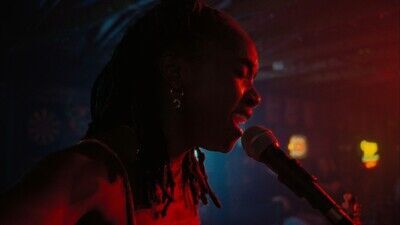Being able to tell a story that was that close to home, in my hometown, about that desire to sing and create music, and being able to reconnect to that, has been profound. Bringing it into my actual life, now performing and sharing my music in a way I had never done, feels amazing. And it feels like it’s all a part of a bigger plan for my life, that acting has brought me back to my music.
You’ve also alternated between acting in movies and theater work. How has your theater background informed your presence as an actor and a musician?
It’s the root of everything that I do. The Chicago theater scene taught me so much about who I am as an artist, and so I’ll always love the art scene here. It just gave me certain gifts—an understanding of craft and a work ethic—that I carry with me wherever I go. That theater background, it’s always with me.
Now I’m trying to apply it to being a singer and giving myself permission not to be perfect. With theater, there’s always something that’s different. Maybe a line came out weird. Maybe you and your scene partner skipped half a page. That might happen, too, with music. Even yesterday, the drummer and bass player couldn’t quite hear the backing track on one song, so the track got ahead of where we were; at some point, I was singing along to the live band, and then I heard my background vocals, and I was like, “Wait, those are ahead! Oh, shit, oh, shit!” [laughs] But that’s part of what’s fun about live performance.
There’s an ephemerality to it, a sense of being in the moment, which is part of the energy that makes a concert so special. In making “Dandelion,” a film that explores the artistic process and a songwriter finding her voice through all these finite moments of tension and connection, I’m curious how your perspective on the concept of the artist’s journey has evolved.
That’s part of what drew me to the film: the exploration of an artist’s process, particularly a songwriter’s process. I’ve been writing songs since I was a kid, so I was digging deeper into that and also into some of the ideas we as artists wrestle with, the questions that we have to ask ourselves, the things that keep us up at night.

